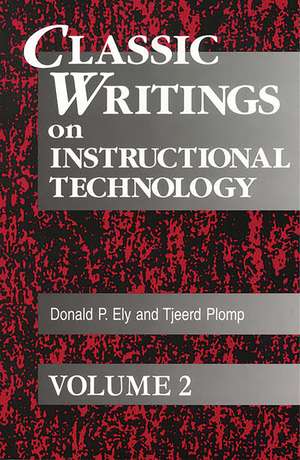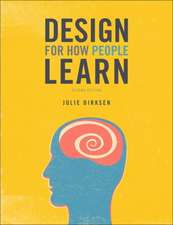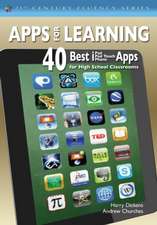Classic Writings on Instructional Technology: Volume 2
Autor Donald P. Ely, Tjeerd Plompen Limba Engleză Paperback – 14 ian 2001 – vârsta până la 17 ani
Preț: 388.93 lei
Preț vechi: 506.91 lei
-23% Nou
Puncte Express: 583
Preț estimativ în valută:
74.42€ • 77.70$ • 61.59£
74.42€ • 77.70$ • 61.59£
Carte tipărită la comandă
Livrare economică 05-19 aprilie
Preluare comenzi: 021 569.72.76
Specificații
ISBN-13: 9781563088544
ISBN-10: 1563088541
Pagini: 268
Dimensiuni: 152 x 229 x 19 mm
Greutate: 0.49 kg
Editura: Bloomsbury Publishing
Colecția Libraries Unlimited
Locul publicării:New York, United States
ISBN-10: 1563088541
Pagini: 268
Dimensiuni: 152 x 229 x 19 mm
Greutate: 0.49 kg
Editura: Bloomsbury Publishing
Colecția Libraries Unlimited
Locul publicării:New York, United States
Notă biografică
DONALD P. ELY is Senior Associate for Educational Technology, Syracuse University, New York, Visiting Professor of Instructional Systems Development, Florida State University, and Adjunct Professor of Instructional Science and Technology, University of Twente, Netherlands.TJEERD PLOMP is Professor, University of Twente, Netherlands.
Cuprins
Contents for Volume 1IntroductionPart 1: Definition and Conceptual BackgroundChapter 1: The Proper Study of Instructional TechnologyChapter 2: Situated Congnition and the Culture of LearningChapter 3: Objectivism Versus Constructivism: Do We Need a New Philosophical Paradigm?Part 2: Design and Development FunctionsChapter 4: The Systematic Design of Instruction: Origins of Systematically Designed InstructionChapter 5: In Search of a Better Way to Organize Instruction: The Elaboration TheoryChapter 6: Emerging Technologies, ISD, and Learning Envirnoments: Critical PerspectivesChapter 7: Levels of Use of the Innovation: A Framework for Analyzing Innovation AdoptionChapter 8: Course Improvement Through EvaluationPart 3: Delivery OptionsChapter 9: Reconsidering Research on Learning from MediaChapter 10: Learning with MediaChapter 11: Who Needs Computers in Schools, and Why?Chapter 12: Displays and CommunciationChapter 13: Development and Use of the ARCS Model of Motivational DesignChapter 14: Distance Teaching and Industrial Production: A Comparative Interpretation in OutlinePart 4: The ProfessionChapter 15: Educational Technology-Adolescence to Adulthood










